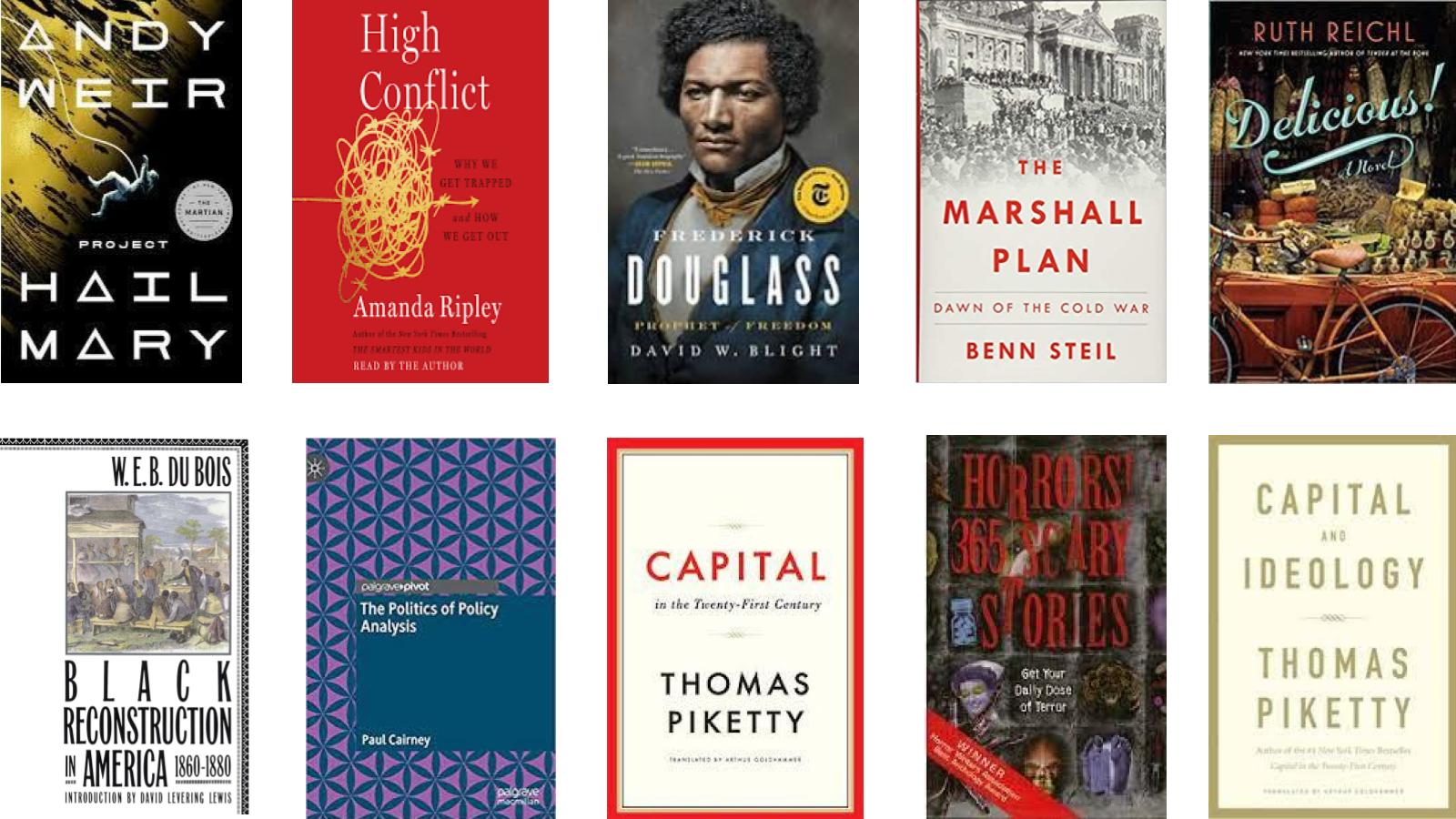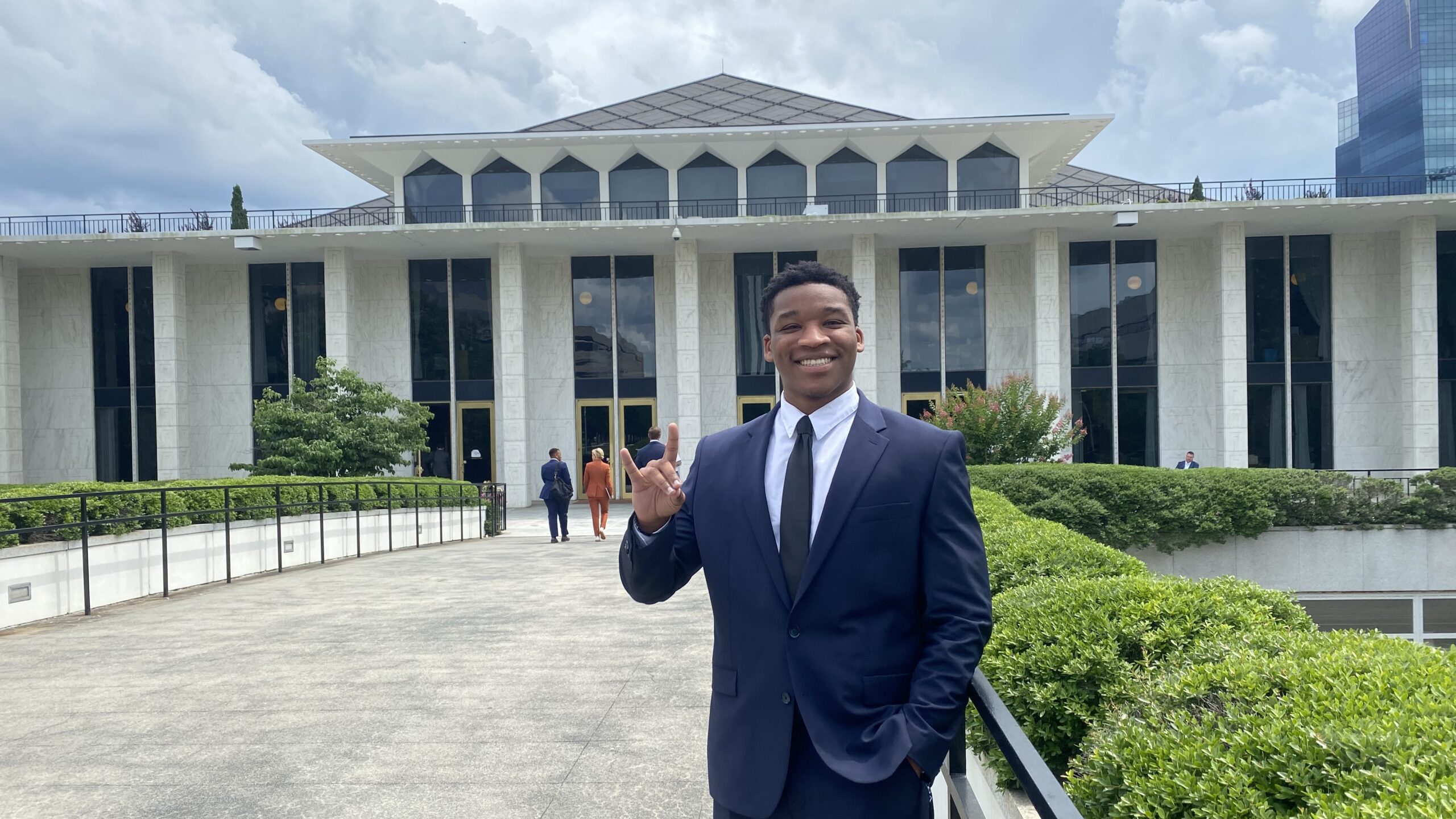SPIA Faculty’s Summer Reading

What are you reading this summer? Is it for school, work or pleasure? There is something about the long lingering days that makes summer reading different from what we do during the academic year. With that in mind, we asked faculty in the School of Public and International Affairs to tell us about some of the books they are reading this summer and why they chose these titles.
Jim Zink, Associate Professor of Political Science
Project Hail Mary by Andy Weir. This hard science fiction novel tells the story of an astronaut sent on a mission to a “nearby” (i.e., 13 years away) star to find a solution to the sun’s rapidly dwindling energy, which has led to environmental catastrophe on earth. I’m reading it for the same reason I read Weir’s The Martian—lots of compelling problem solving, fun physics stuff, a fair bit of interesting speculative science, interesting take on communication during a first contact scenario and so on. I recommend it because it is entertaining.
I am also reading W.E.B. Du Bois’s Black Reconstruction in America because it is one of (if not the) first correctives to the (now discredited) Dunning School, which depicted reconstruction efforts as dramatic federal overreach and a misguided attempt to provide civil rights to newly released slaves who were ill-equipped to exercise them responsibly. Among many other things, Du Bois shows that reconstruction was abandoned precisely because Blacks were very effective at exercising their new rights and emerged as important political/economic/social actors (and thus threats to white power). I recommend it because, in addition to ably covering an important era in American history, the book—both its subject matter and Du Bois’s treatment of it—serves as a reminder that the current moral panic over critical race theory, the 1619 Project, etc., is just the latest iteration of the evergreen pushback against any attempt to highlight the agency and valuable contributions of African Americans to the American amalgam.
Andrew Taylor, Professor of Political Science
I’m reading Benn Steil’s book on the Marshall Plan. Maybe it’s a function of getting old or being locked down for so long, but I’ve been really interested in the 1940s and 1950s lately. The book explains how various actors within the Truman administration and congressional leadership transformed a modest plan to support European nations devastated by war into a huge effort tied to their economic and political reconstruction that antagonized the paranoid Soviets. Without the Marshall Plan there would have been no NATO and perhaps no Cold War. A great book for history buffs and students interested in international diplomacy.
Anthony Solari, Assistant Teaching Professor of Political Science
I am reading two works by Thomas Piketty: Capital in the Twenty-first Century and Capital and Ideology. These are important works in political economy that are relevant to contemporary debates on the maldistribution of wealth in capitalist economies. The works make their way into my class lectures on American political economy. I recommend them to students as a good read on economic history and capitalist development for those who don’t have a background in this area of thought. As a diversion from more serious material, I am also reading Horrors: 365 Scary Stories by Dziemianowicz and Weinberg. I am a 50’s science fiction and horror fan and at Halloween we give out a scroll with ghost or scary stories in it as a treat for the parents. They love it and I am mining this year’s stories from this book.
Mark Nance, Associate Professor of Political Science, Director of the Master in International Studies program
I’m finishing David W. Blight’s Pulitzer-Prize-winning biography, Frederick Douglass: Prophet of Freedom. It’s a massive, 750-page work that traces Douglass’ entire, remarkable life. What really stands out to me is how incomplete a “second revolution” the Civil War was. Racism remained firmly entrenched in the United States. The South remained violently anti-black, but even many abolitionists were against formerly enslaved Black people gaining equal rights. And while many commentators today like to highlight Douglass’ talk about the need for the formerly enslaved to be self-sufficient, he was adamant that such progress was only possible if White people would give them a level playing field. That meant ending institutional discrimination, letting them vote, ensuring equal justice under the law, and compensating them for their exploitation under slavery. Those policies were only going to come to fruition through federal regulation. Southern states advocated instead for “states’ rights,” a transparent strategy to allow the South to continue with blatantly racist policies. The book makes it clear that so much of what we fight about regarding race and diversity today is just a continuation of the struggle that Douglass was leading for most of his life.
Heidi Hobbs, Associate Professor of Political Science, Director of Faculty Engagement Global Learning for All, Office of Global Engagement
In Delicious! by Ruth Reichl, foodies, first jobs and World War II on the homefront unite. Reichl, food critic and former editor in chief of Gourmet magazine, tells the fictional story of a young woman from California who has taken a job at the prestigious Delicious magazine in New York City. The book explores the unique food culture of New York, the challenges of a first job, and a duckling into swan transformation. Through a collection of forgotten letters written to famous chef James Beard during World War II, the realities of the home front come to life—from the tragedy of wartime death and injury to recipes using ration coupons for meals. For political scientists, this insight into the progression of World War II and homelife is particularly illuminating, though I don’t think I will be eating milkweed salad or pumpkin leaves anytime soon.
Steven Greene, Professor of Political Science, Director of Undergraduate Programs, Department of Political Science
I’m reading High Conflict by Amanda Ripley. It’s about how we get locked into patterns of conflict that become both destructive and hard to break out of. Naturally, there’s also advice on how to break out of these patterns. This, of course, applies to politics, but also marriage and family, religious disputes, and all sorts of social interaction. Ripley is a journalist who knows how to tell great stories about her subjects so the book is presented in a highly-engaging and readable style. I am already taking some of the lessons to heart to try and reduce conflict in my life.
James Brunet, Associate Professor of Public Administration, Director of Public Safety Leadership Initiative
How best to learn about police work? Join the force. Georgetown law professor Rosa Brooks recounts her journey on becoming a Washington, DC, reserve police officer in Tangled Up in Blue: Policing the American City. The book is part ethnographic study and part personal reflection on her complex relationship with her mother (noted journalist and activist Barbara Ehrenreich). Brooks’ description of police-citizen encounters in D.C.’s most crime-ridden neighborhood whipsaws from violence to benevolence within a single turn of a page. The book concludes with a hopeful message for training officers in more humanistic methods of policing.
Thomas Birkland, Professor of Public Policy, Associate Dean for Research and Engagement, College of Humanities and Social Sciences
I am reading The Politics of Policy Analysis by Paul Cariney. I am reading it because I need to update the section on policy analysis in my textbook. In particular, this book resonates with me because it makes the point that I try to make in the book—that policy analysis is an activity that various actors undertake in the policy process, often to pursue certain goals. In my policy process textbook, I make the point there’s really no such thing as fully technical and neutral policy analysis. This book, as do others in the field, makes this point very effectively.
- Categories:


